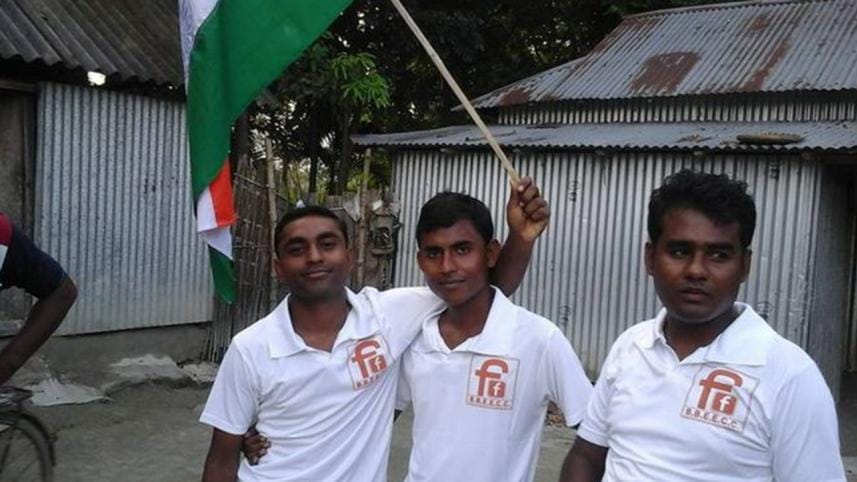Meet the Facebook reporters of India-Bangladesh enclaves

A landmark land deal between India and Bangladesh will see the two countries swap more than 160 enclaves located in each other's territory. Now the two governments will swap enclaves, finally giving residents access to public services they have been denied. BBC Monitoring's Vikas Pandey speaks to a group of "Facebook reporters", who have been the main source of information from these enclaves in the past few years.
Saddam Mia, a 23-year-old resident of a Bangladeshi enclave inside Indian territory, is a Facebook reporter.
His main focus is to highlight, on social media, the plight of tens of thousands of enclave residents like him, who have been marooned on the wrong side of the India-Bangladesh border and ignored by both countries.
He and his team have been using Facebook to report news of misery, neglect, crime and other details from the enclaves since 2013.
Saddam says the mainstream media have largely ignored the identity struggle of enclave residents who have also been denied access to basic facilities like proper healthcare and education.
"Many of us had to get our college degrees on fake identities because we were living inside India but were not Indian nationals," he told the BBC.
Problems like these prompted Saddam and some friends to use social media to highlight their issues.
They worked at the media cell of the Bharat Bangladesh Enclave Exchange Coordination Committee, a group that has been working to resolve the enclave crisis.
The group set up a Facebook page and asked at least one person in every enclave to be a "Facebook reporter".
Saddam says they reported problems like "sanitation, criminal activities, the absence of healthcare and often mainstream media outlets in Bangladesh and India picked up our stories".
His colleague Roushan Sarkar says Facebook gave them a medium to connect with the outside world.
"Living in the enclaves has not been easy. We never had proper roads, but the worst was not having a proper national identity," Roushan says.
Facebook gave us a platform but more aptly a purpose that brought all the reporters in the enclave together. We were committed to highlighting our case and generating public awareness that such enclaves existed," he says.
And what kind of response did they get from the "outside world"?
Saddam says that journalists often got in touch to get more details "about the stories we would post".
"But it was always great to hear from common people and their views. We would often tell our followers that more than 50,000 people lived as a "stateless population". Most of them understood our pain," he said.
'We still have a job'
All of this may be about to change though.
At midnight on 31 July, India and Bangladesh will reclaim possession of enclaves that fall within their borders, and residents have been allowed to choose a nationality.
Saddam says the day has come after decades of struggle and hardship endured by the residents, adding that most people in the enclaves are "looking forward to getting a national identity and it's time to celebrate".
But what will become of the "Facebook reporters" once the enclaves are swapped?
Roushan says that they are likely to launch a new page because a lot remains to be done.
"More than 60 years of neglect cannot be compensated with a few days of attention. So we still have a job," he says.
Saddam agrees and adds that his colleagues will continue to highlight stories from the enclaves.
"It was hard to get something as basic as polio vaccines. Higher education was a distant dream and proper healthcare has been almost absent," he says.
He adds that his Facebook reporters will keep an eye on development projects in the area.
"Our job is far from over. It's a happy occasion, but we want to remain alert about life and problems in the enclaves," he says.



 For all latest news, follow The Daily Star's Google News channel.
For all latest news, follow The Daily Star's Google News channel.
Comments